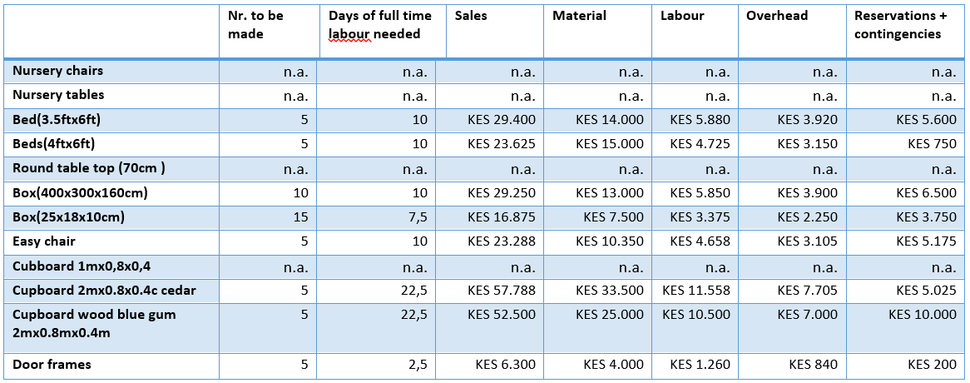Finance Appendix A: Results and overhead costs first half of 2015
In this overview the financial situation of the carpentry workshop and SRI are being outlined. Al prices in the table below are in Kenyan Shilling (KES).
The first table shows all the products made in this last half year and the associated information. In the first column the material costs can be found for making one product of that kind. In the second column a factor for the quality/complexity is given. This factor has been added because the quality went up and some items where complicated to make, the amount of material used in some items was very little compared to the time involved to make them. By multiplying those two a new amount is generated who fits better with the effort put into the product. When the labour and overhead costs are being determined the sales price per product can be calculated by summing up quality/complexity x material costs, labour costs and overhead costs.
Finance B: Estimation of the total production
The products chosen on this page have a reasonable income generating capacity in 2015. As can be seen, some products are left out (‘n.a.’); those products are not profitable unless they are being sold at a much higher price.
Finance C: Estimation of the production growth
Finance D: Budget last six months of 2015
- Sales of products calculated with 4 elements: material, complexity/ quality factor, labour and overhead.
- Commitment fee: The apprentice that are in their early stages should pay a commitment fee. This is not a trainings or school fee, but a fee to cover some of the costs for food and material that is needed to start mastering the basic skills.
- Rent of the guesthouse is not for the workshop. This income goes to SRI´s general income.
- Material costs including transport costs for material and if applicable, sold products, are included in this some.
- Labour is only for those who have a direct link with the production.
- Salary is paid to those who are having functions in the overhead like George, the watchmen and the person staying full time on the site. Because they also have a function for the other SRI activities on the site.
- For travel expenses a solution has to be found. Flying carpenters finds it a must that expenses made by those who work for the workshop or SRI. As we as FC volunteers experience it is impossible to ask for receipts in the public transport. A solution could be, to make it an intergraded part of the salary. The carpenter could be payed as the other local people who come to assist on an irregular basis for building or other jobs that are done.
- Office costs are also split over the workshop and SRI. They should include airtime/ telephone compensation and if possible some training/ assistance for George on learning the basics on using excel or an accounting program on the computer.
- Electricity goes down because we expect the solar installation to function from August onwards. 30 % of the remaining costs are to be covered by other SRI activities.
- All this together creates a deficit for the carpentry workshop. SRI has to find sources for this deficit. FC has, with the help of donors, invested in the first year about 4 times as much as intended in the original budget on salaries and start-up costs.




